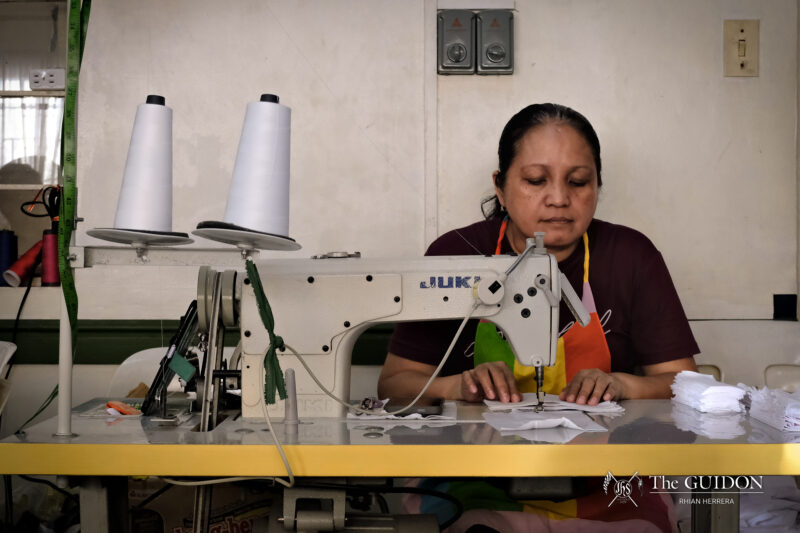Elegance and simplicity: These two words come to mind when one looks at the woman sitting across the table, her effortless smile complementing her easygoing personality. Her eyes wander as she pauses thoughtfully from time to time; here, seated in the Fine Arts Program, she seems completely at ease.
For Mookie Katigbak-Lacuesta (AB COM ‘01), writing came just as naturally. Coming from a “literary family” that encouraged her to read and write, she first realized she wanted to write poetry at the age of 12. This interest proved to be the start of a very fruitful career later on; her work can be found in several publications and she even came out with two of her own collections of poetry, The Proxy Eros (2008) and Burning Houses (2013).
Today, Katigbak-Lacuesta is a three-time Palanca Award winner, most recently having won first place for her collection of poems entitled “We Won’t Be Tending Gardens” at the 2014 Carlos Palanca Memorial Awards for Literature. While many only know of her as an award winner, there is much more to Katigbak-Lacuesta’s story than meets the eye.
The poet’s tale
Most writers describe what they do as a calling, others, a love affair. Katigbak-Lacuesta is more partial to the former, having never outgrown her love for the written word. “I had my very first poem published [in Heights Ateneo] when I was a freshman, when I was about 17,” she says. “Heights published it even if it was phenomenally bad, but for some reason, I think the editor was quirky enough to see the potential—not the product, but the potential.”
Straight out of college, she pursued her Master of Fine Arts at the New School University in New York. When asked about her choice of school, she laughs. “I found out my favorite writer was teaching there. When you’re young, your reasons are so simple,” she explains. “I wasn’t [stalking the writer], but I liked the work.”
The atmosphere was a creatively challenging one. “[Once, we even had to] write a poem [as if we were] Wallace Stevens mimicking Gertrude Stein. It really blew my mind!” she exclaims. Unorthodox lessons such as this showed her that there was more to poetry than metaphor and “organic unity”—one could simply experiment and have fun by combining the poetic styles of various writers.
Over the years, Katigbak-Lacuesta has incorporated these tips and tricks into her writing. Still, she is quite modest about her accomplishments, adding that her work has been published “here and there.” In reality, she has already earned her literary bragging rights by getting published in the likes of the Philippine Graphic and the University of the Philippines’ literary journal Likhaan.
It is this wealth of experience that Katigbak-Lacuesta brings to the classes she teaches at the Fine Arts Program. “Initially, she came off as someone who is quite confident about herself, someone who had a very powerful personality,” recalls philosophy senior Russ Caynap, who took her poetry workshop as an elective because he had been impressed by a poem of hers in high school.
As intimidating as she may sound, Caynap adds that she was never one to take herself too seriously. “She may seem stern at times, but she is actually a very funny professor. Sometimes she makes us think she’s serious about a certain remark, but she suddenly laughs about her own sarcasm.”
Serendipitous beginnings
When one looks at the timeline of Katigbak-Lacuesta’s life, it is easy to assume that her life was very career-oriented. Even she admits that upon reflecting on her past decisions, “I was very one-track minded, very monomaniac. It was all about writing, writing, writing, that’s it.”
This isn’t necessarily a bad thing, since writing wasn’t just confined to her professional life. For instance, after returning home from New York, she found herself joining a band called The Big However. “[The band] found out that I was a poet, so they gave me music to listen to,” she recounts.
Turning poetry into lyrics and forming melodies were her contributions to the band’s work, on top of being its vocalist. “I would write my own songs, sometimes I would adapt from poetry, like Dr. Benilda Santos’ work, to make a rock song based on ‘Bago ang Wakas’ or based on ‘Kundiman’ by [Emmanuel] Lacaba,” she explains. “We’d sing the songs in various bars and we got paid in viands like barbecue.”
The story of how she and her husband met is no exception. She remembers randomly wondering one day if she should watch French films “for the nuances.” At a party that same night, she met Sarge Lacuesta, now a multi-award winning fictionist and Esquire Philippines’ editor-at-large, who coincidentally struck up a conversation with her about French movies. “I wasn’t ready for a relationship [at the time], but a year after, we met again,” she shares with a smile. “The rest is history.”
According to an article by Alfred Yuson in the The Philippine Star, the couple was hailed as “the Brangelina of Philippine literature” by the guests at their wedding in 2009. Katigbak-Lacuesta considers him not just as her life partner but also as her ultimate mentor. “[He] told me to break away from [my comfort zone] and try new avenues of expression, new subject matters. He’s my first critic, so when I write something, I show him first.”
She put her writing on hold for a few years after getting married to attend to other responsibilities, first as a wife then later as a mother. She notes how being married lets her share her experiences with the people she loves. “Writing is solitary… You’re just in your own world. Being married forced me to go out of that world, to really share my love, not just live for myself but live for other people.”
The creative process
Being a successful writer entails commitment—writer’s block strikes at the most inconvenient of times and one too many rejections can take their toll. These discourage even the best of writers, but Katigbak-Lacuesta has certainly persevered. “It’s not a nine-to-five job where if you do your best, you get promoted. [Even] if you put in the hours, it doesn’t mean you’ll become a celebrated writer.”
As a writer, she believes that her biggest accomplishments thus far have been her two collections of poetry, as they reflect just how unique the creative process is. “There is nothing there, then you create something. You have a project or an individual poem, then it just grows and grows.”
Her poems have grown into beautiful works indeed. Inspired by a visit to the University of Santo Tomas Museum of Arts and Sciences, “We Won’t Be Tending Gardens” is a collection of poems that embodies the themes of migration. “In my poems, I write from the perspective of people, mostly writers, in Philippine history, people who are part of the diaspora,” she explains.
The title is “a kind of Hollywood ending” for Filipino migrant workers. “You won’t be doing this forever, you’ll move on to greater things,” she adds. It also reflects a lot of what she was experiencing in her personal life, which was a desire for a calmer lifestyle that she had envisioned herself as already having at this particular time in her life.
As much as she loves poetry, Katigbak-Lacuesta acknowledges that she eventually wants to explore other types of writing, especially since she has been so focused on poetry for so long. “It’s such an intense area of study, and I kind of want to veer away from that for a while,” she admits. “Maybe I’ll write a script, maybe I’ll write a musical. Maybe I’ll just write a newspaper article, maybe it won’t be a big thing that won’t be so amazing.”
Her admirers need not worry, however, as Katigbak-Lacuesta makes this promise: “I will go back to poetry, no matter what.”







